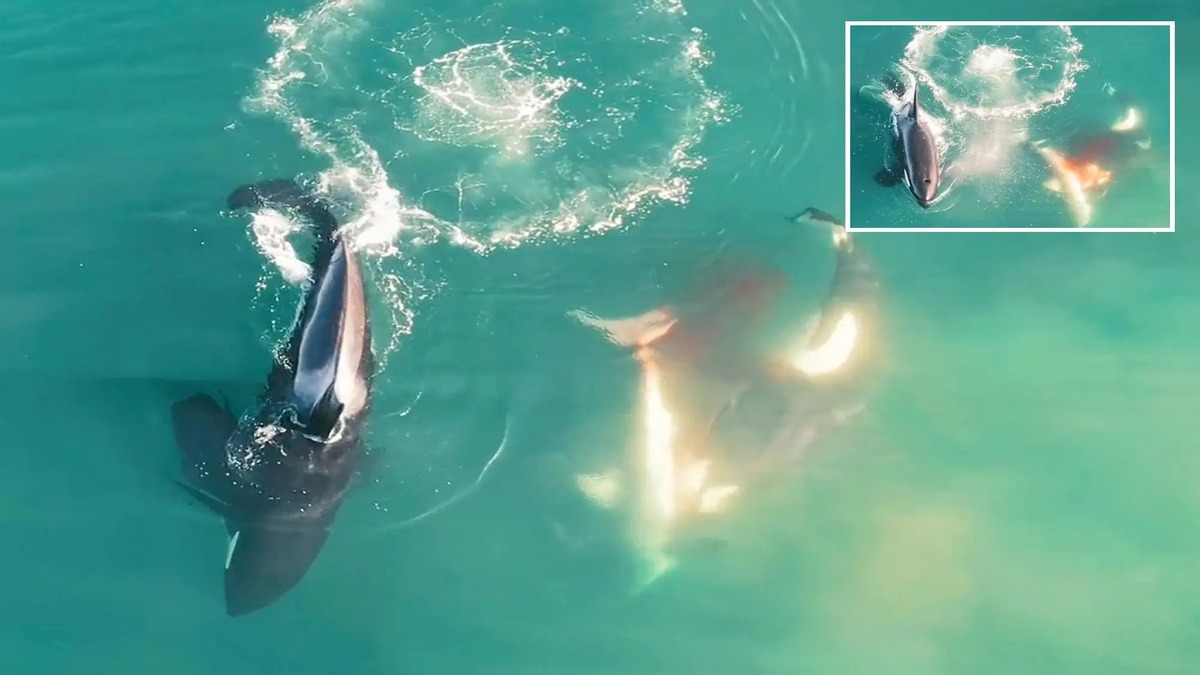Orca, or the killer whale, has been previously known for hunting sharks, dolphins, and even solo whales.
However, dramatic footage has been released showing the moment a lone killer whale attacked and ate a great white shark before swimming off with the victim’s liver in its mouth.
Scientists have called it an “unprecedented” display of predatory prowess unfolded in a matter of just two minutes.
Let’s take a closer look.
The smash-and-grab attack
The African Journal of Marine Science has provided extensive documentation of the incident that took place on 18 June 2023, off the coast of Mossel Bay, South Africa.
The attack involved a killer whale, nicknamed Starboard, previously observed by scientists, attacking a juvenile great white shark.
According to the report, the team of researchers launched a boat shortly after 2 pm to observe the two killer whales, including another killer whale called Port.
The latest attack was indicated by the scent of shark liver and the sight of diving kelp gulls as the vessel traversed the water to follow the pair.
The attack that followed happened quickly at 3.02 pm – a young white shark surfaced in the water and was followed immediately by Starboard.
Impact Shorts
More ShortsThe whale “gripped the left pectoral fin of the shark and thrust forward with the shark several times before eventually eviscerating it” and just minutes later Starboard was seen with “a bloody piece of peach-coloured liver in its mouth,” The Guardian cited the report.
Port, Starboard’s second male companion, did not get involved and was approximately 329 feet away from the attack scene.
Even though Starboard was able to kill the juvenile great white shark, which was thought to weigh approximately 100 kilogrammes and measure about 2.5 metres in length, the team suggests he could need to work with others to take on larger prey. Great white sharks can reach an adult size of 2.5 tonnes and 6.5 metres.
Researchers and tourists on board another vessel that had participated in shark cage diving activities also recorded the incident.
Why scientists are worried
According to experts, the incident off the South African coast provides fresh information on orcas’ hunting behaviour.
The killer whales – nicknamed Port and Starboard because their dorsal fins are curved in opposite ways, have been hunting together off the coast of South Africa recently, according to earlier studies conducted by the scientists.
Researchers say it’s still unclear how orcas open huge sharks to feast on shark livers, even though the two seem to have a preference for the organs.
The researchers said all previous instances of orcas hunting sharks in the area that have been documented involved two to six orcas and usually lasted for two hours.
Their attacks have sparked worries that different shark species, such as great white sharks, would be driven from coastal areas.
Witnessing the attack by Starboard, Dr Primo Micarelli, a co-author of the new study from the Shark Studies Centre and Siena University, said it was an unforgettable experience to witness the orca carry the great white shark’s liver past the vessel he was aboard.
But he added, according to The Guardian, “Despite my awe for these predators, I’m increasingly concerned about the coastal marine ecology balance.”
It was impossible to determine if the behaviour was new or just being seen for the first time, Marine mammal scientists Dr Luke Rendell from the University of St Andrews noted, as per BBC. “But what really stands out is is how skilful these animals are as hunters.”
Although the scientists are unsure of the cause of the behaviour, Dr Towner told BBC News that it was becoming more and more obvious that “human activities, like climate change and industrial fishing, are exerting significant pressures on our oceans”.
Killer whales that hunt sharks may also suffer health effects from consuming metals and poisons found in shark flesh.
“Disruptions in the balance of apex predators can affect other species too. Endangered African penguins could face increased predation by cape fur seals (if the fur seals are not being eaten by) white sharks,“ Dr Towner explained.
Dr Towner added that every discovery in these interactions (between orcas and sharks) was “fascinating.”
With inputs from agencies


)

)
)
)
)
)
)
)
)



